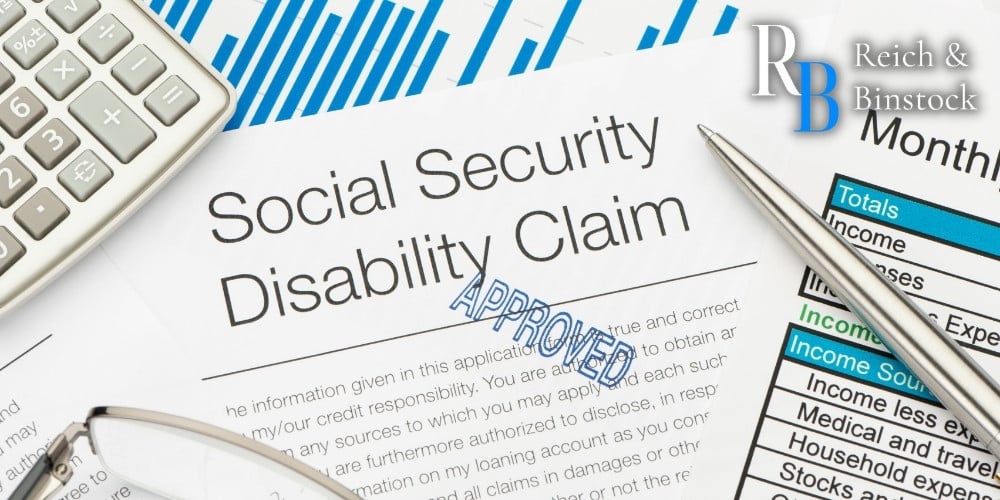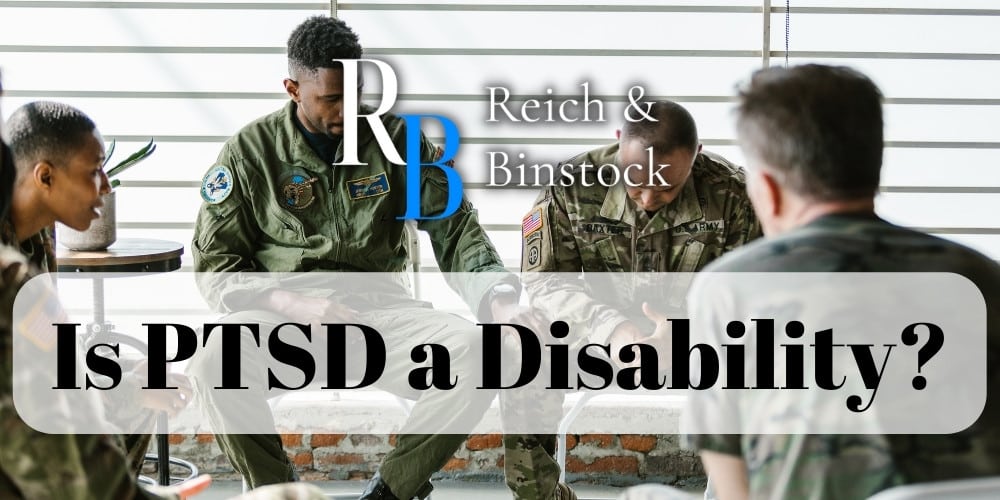After veterans and active service members endure a traumatic experience, they may develop a psychiatric disorder known as Post Traumatic Stress Disorder (PTSD). When someone either experiences or witnesses a traumatic event, this can trigger the development of PTSD. As many veterans already know, this mental health disorder can be extremely debilitating in everyday life. Many suffer losses related to their PTSD and end up wondering if they can receive PTSD disability benefits. So, is PTSD a disability? Read our blog to learn more.
At Reich & Binstock, we believe in helping others fight for their legal rights. If you or a loved one suffers from PTSD related to your military service, you may qualify for VA disability benefits or for social security disability benefits for PTSD. Our VA disability lawyers have extensive experience advocating for the rights of veterans and their family members. To schedule a free consultation with us about your case, please call our Houston personal injury lawyers at 713-622-7271 today.
What Is Post Traumatic Stress Disorder (PTSD)?
If you’ve ever been involved in a Houston car accident, you probably know what it’s like to feel shaken up and on edge after a traumatic event. Most people eventually overcome their sleepless nights and negative emotions with time. However, those with PTSD may not see relief for months, years, or even longer. Post traumatic stress disorder (PTSD) is a mental disorder that can develop after seeing or experiencing a traumatic event.
PTSD can have many symptoms, such as severe panic attacks, irrational fear, and even anxiety disorders as a result of trauma. Someone suffering from post traumatic stress disorder is likely to experience issues in their daily life, including at work and in personal relationships. It can even affect their physical health if they have frequent nights of poor or nonexistent sleep. With treatment, many fully recover from this mental illness. However, some don’t see relief until years down the road, after their lives have already been disrupted.
How Does PTSD Happen?
When someone experiences a trauma, the body undergoes an intense fight-or-flight response. This response releases stress hormones into the bloodstream to energize the body. Your heart rate increases and the brain changes its priorities to put certain actions on hold. When PTSD takes hold, your brain is essentially stuck in this constant state of danger.
The body also continuously sends out signals of stress, which is what leads to the symptoms of PTSD. The part of the brain that is responsible for emotions and fear, the amygdala, is noticeably more active in those with PTSD. As this state continues, PTSD actually changes the structure and function of the brain. The hippocampus, which is the part of the brain that is responsible for memory, gets smaller.
What Does the VA Consider Trauma?
We’ve mentioned that a traumatic event is the cause of post traumatic stress disorder. But what exactly does the VA consider a traumatic event? According to their website, the following occurrences are considered traumatic events by the VA.
- Suffering a serious injury
- Personal trauma
- Sexual assault, sexual trauma, or a sexual violation (such as Military Sexual Trauma)
- Actual or threatened death
- Threatened injury or sexual assault
While this is as far as the VA’s list goes, there are plenty of other traumatic events that can lead to PTSD. Below, we list other known causes of post traumatic stress disorder.
- Abuse, bullying, or harassment
- Child sexual abuse
- Being kidnapped or held hostage
- Experiencing any form of violence
- Receiving a shocking medical diagnosis
- Undergoing treatment for mental health issues in a mental health ward
- Losing a loved one or someone else close to you
- Secondary trauma, which can involve seeing someone get hurt or killed
- Performing a job that is frequently stressful, such as emergency services
- Experiencing a traumatic childbirth or witnessing one
- Living through a natural disaster or a pandemic
How Likely Is PTSD for Veterans?

According to the National Library of Medicine, approximately 8% of all American adults suffer from PTSD each year. However, this problem is far more significant among veterans. This is partially because they are at a higher risk of developing PTSD, but it also stems from the fact that certain barriers often prevent them from receiving adequate treatment.
These barriers come in the form of VA requirements that they must meet before they can receive VA disability benefits for PTSD. The Department of Veterans Affairs requires that the veteran receives an honorable or general discharge in order to receive disability benefits. However, VA medical centers often have long waiting lists, and military communities, unfortunately, tend to have social stigmas surrounding mental illness.
The Department of Veterans Affairs has collected data about the prevalence of PTSD in veterans depending on their era of service.
- Vietnam War: Approximately 30% of Vietnam veterans are estimated to have had PTSD during their lifetimes.
- Gulf War: Approximately 12% of Desert Storm veterans have PTSD in any given year.
- Operation Iraqi Freedom (OIF) and Operation Enduring Freedom (OEF): Anywhere from 11-20% of OIF and OEF veterans suffer from PTSD in a given year.
PTSD Symptoms
The range of PTSD symptoms is fairly broad and can vary greatly from person to person. Some symptoms may be mild, while others can be so severe as to impact your daily life. Below, we list some notable symptoms of PTSD.
- Depression
- Anxiety
- Rage
- Nightmares
- Flashbacks
- Feelings of guilt
- Suspicion
- Chills or shaking
- Panic attacks
- Headaches
- Heart palpitations
- Behavioral changes
- Difficulty sleeping
- Mood swings
- Suicidal thoughts
- Impaired concentration
- Muscle tension
- Intense apprehension toward certain situations
- A marked difficulty socializing
- Other severe symptoms
Types of PTSD Symptoms
There are four main types of PTSD symptoms: reliving, avoidance, cognitive, and reactivity (hyperarousal). We’ll explain each of these below.
- Reliving symptoms: These are symptoms that can make you feel as though you’re experiencing the trauma all over again. Examples of these symptoms are nightmares, intrusive memories, flashbacks, and autonomic hyperactivity. Anything that reminds you of that trauma can trigger reliving symptoms.
- Avoidance symptoms: Sometimes, veterans tend to avoid people, places, objects, or situations that can trigger their PTSD. You may even avoid thinking about it altogether or even change certain parts of your daily routine to avoid a trigger.
- Cognitive symptoms: These generally involve negative thoughts about others or about yourself. Examples include depression, having difficulty trusting people, feelings of guilt or shame, and difficulty maintaining social functioning.
- Reactivity (hyperarousal) symptoms: Rather than having symptoms show up after a certain trigger, these symptoms tend to be more constant or persistent. Someone experiencing reactivity symptoms will likely have marked difficulties concentrating, an anxiety disorder (such as generalized persistent anxiety), difficulty sleeping, worsening psychiatric symptoms, a loss of practical personal skills, and even an exaggerated startle response. Sufferers may also engage in unhealthy behaviors, risky behaviors, smoking, drinking, or substance abuse.
PTSD Treatment
Although trauma and stressor-related disorders can be difficult to live with, there are a few very effective forms of medical treatment for PTSD and its symptoms. More specifically, several forms of mental health therapy have been found to effectively treat or manage PTSD. Most of the different types of therapy are a form of cognitive behavioral therapy. The main treatment goals are to improve your symptoms, restore your self-esteem, and teach you the appropriate skills for dealing with PTSD. Below, we list some of the most effective ways to treat PTSD in veterans.
- Cognitive processing therapy
- Prolonged exposure therapy
- EMDR (eye movement desensitization and reprocessing)
- Stress inoculation training
- Medication management
As we mentioned earlier, PTSD symptoms vary greatly from person to person. The medical requirements to treat it also vary depending on each person. Often, a combination of both medication and mental health therapy is necessary to achieve the desired outcome. Additionally, how long the symptoms last depends largely on each person and their symptoms. While some may only suffer from post traumatic stress injury symptoms for a few weeks, others might deal with their symptoms for months or even years.
Is PTSD a Permanent Disability?
Currently, the VA does consider PTSD to be a permanent disability. The disability rating assigned to each person depends on both the severity of their symptoms as well as how intensely they impact your daily life. Once you file a disability claim with the VA, they will verify a direct connection between your service and your hospital records of PTSD. In the following sections, we will outline how to obtain disability benefits when you file PTSD disability claims either with the VA or with social security.
How Can I Get Disability Benefits for PTSD?
Veterans who develop PTSD as a result of their service may be eligible to receive VA disability benefits for PTSD. In order to qualify for disability compensation, all of the following must be true.
- Your PTSD results from a stressor that occurred during your time of service.
- Due to your symptoms related to PTSD, you can no longer function as well as you could on a daily basis.
- You have medical records that show a PTSD diagnosis from a doctor.
As long as you can prove these three elements, you should have no trouble with your disability claim. However, the VA is unfortunately notorious for either denying disability compensation or taking too long to respond to claims. If you need disability benefits help, a VA disability lawyer with Reich & Binstock is here to help.
Types of PTSD Disability Benefits

So long as you can provide sufficient medical documentation of your condition, there are a few different types of disability compensation that you could receive for PTSD. Below, we list these different types of benefits.
- Social Security disability insurance (SSDI)
- Veterans Administration disability benefits
- Employer-sponsored or private disability insurance
The requirements for each of these can vary greatly, so we recommend speaking with a qualified disability attorney to ensure that you have enough evidence gathered in order to qualify. They can also help in the event that your benefits are denied.
Social security disability benefits provide a monthly stipend to those eligible for benefits. VA disability benefits vary according to each person’s disability rating. In general, the higher the rating, the higher the monthly stipend received by the person. Private or employer-sponsored benefits have perhaps the greatest level of variance, as each insurance policy can be very different. Some policies may only cover short-term disabilities, while others also cover long-term disabilities. To gain a better understanding of these kinds of benefits, read over your policy carefully, or contact your employer for an explanation of benefits.
What Is the Process for Filing for PTSD Social Security Disability Insurance?
In order to receive social security disability benefits from trauma and stressor-related disorders such as PTSD, you must meet certain requirements. The medical listing for a PTSD disability claim requires you to have medical documentation of all of the following.
- Properly medically documented evidence of exposure to death, threats of death, severe injuries, or violent acts.
- An involuntary reliving of the event, disturbance, or stressor
- Changes in behavior or mood swings
- Avoidance symptoms
- An increase in reactivity symptoms
You must also show that you have an extreme limitation or that you have two or more severe limitations in the following areas.
- Interactions with other people (social skills)
- Regulating your emotions
- Adapting to changes in your life
- Exercising practical skills such as cooking and cleaning
- Concentrating on single tasks
- Understanding, learning, and remembering information
You can also provide medical records of the following to fulfill the requirements if you cannot prove the above elements.
- Your PTSD diagnosis has been both persistent and significant for at least two years.
- You are currently undergoing treatment, therapy, or you currently reside in a very structured and protective setting.
- You have a minimal capacity or a complete inability to adapt to new changes in your life.
Keep in mind that even if you do not qualify through one of the means we listed above, you may still be able to qualify through a medical-vocational allowance program. Medical-vocational allowance is basically the ability to receive benefits from the Social Security Administration when you can no longer keep a job with a reasonable income due to your medical condition (PTSD).
How Can I Document PTSD to Get Benefits From The Social Security Administration?
As with any other disability, most benefits programs require some form of proof of your PTSD before you can receive benefits. Social security must receive all the medical evidence you have of your PTSD, which includes inpatient and outpatients psychiatric treatment records and even clinic notes. Usually, the Social Security Administration will only request that you provide your previous year of medical records. It’s a good idea to provide as much evidence as possible. Go back as far as you can with medical evidence to give your case more weight. With our experience, we can ensure that you are fully prepared to file your claim with the SSA.
Call the VA Disability Lawyers at Reich & Binstock
At Reich & Binstock, we understand that being denied disability benefits for PTSD can be a frustrating experience. You have plenty of medical evidence to qualify for VA disability or social security benefits, but you’ve been wrongfully denied. This can be not only stressful but also make it difficult to live your life. Our Houston attorneys are here to help you with your VA, or SSDI benefits claim, no matter what part of the process you’re in. To schedule a free evaluation of your case, please call our Houston law office at 713-622-7271 today.













